Law students serve entrepreneurs overseas through Business on the Frontlines
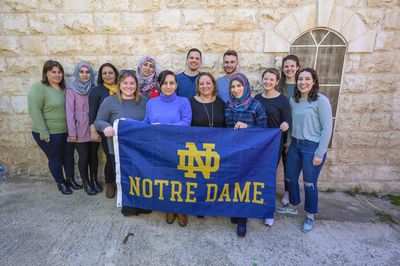
Midway through the spring semester, as the coronavirus pandemic began to halt travel plans and change the daily routines of people around the world, third-year law student Melanie Hess was in Olancho, in eastern Honduras, serving the Olancho Aid Foundation in developing an economically sustainable community there. Molly Jergenson, also a third-year law student, was in the West Bank to work with a nonprofit women's economic empowerment initiative in the Palestinian village of Zababdeh.
Notre Dame brought both women home safely, but not before they had contributed to the greater good.
Notre Dame Law students eager to serve societies crippled by war and deep poverty can enroll in an interdisciplinary course offered by the Mendoza College of Business called Business on the Frontlines. The program brings together graduate students and faculty from across the University of Notre Dame to work on business and peace-related projects with partners in the field, primarily international humanitarian organizations. For the first part of the course, the students identify a problem and develop a business plan to address it. Then, over spring break, they travel overseas to put their plan into action.
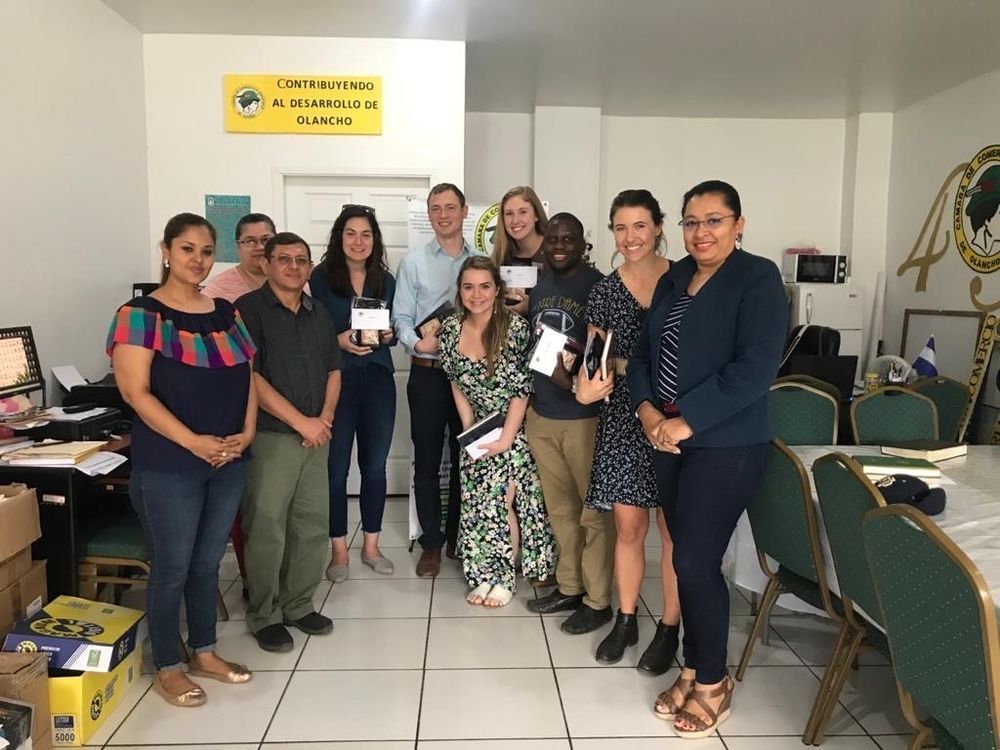 Melanie Hess, second from right, and other Notre Dame students visited the Olancho Aid Foundation in Honduras during spring break as part of Business on the Frontlines, a course offered by the Mendoza College of Business.
Melanie Hess, second from right, and other Notre Dame students visited the Olancho Aid Foundation in Honduras during spring break as part of Business on the Frontlines, a course offered by the Mendoza College of Business.Hess explained that many young people are forced to leave Honduras' Olancho Valley — and often the country altogether — in search of work. In fact, 62 percent of area residents live below the poverty line, which drives a huge outflow of immigration to the United States. Congressional Research reports estimate that about 600,000 people born in Honduras now reside in the U.S. and that 70 percent of those are undocumented. Remittances from relatives living in America make up about 8 percent of the Olancho Valley’s GDP.
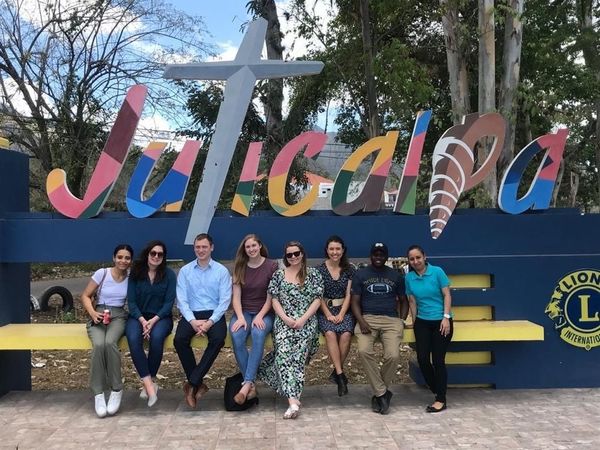
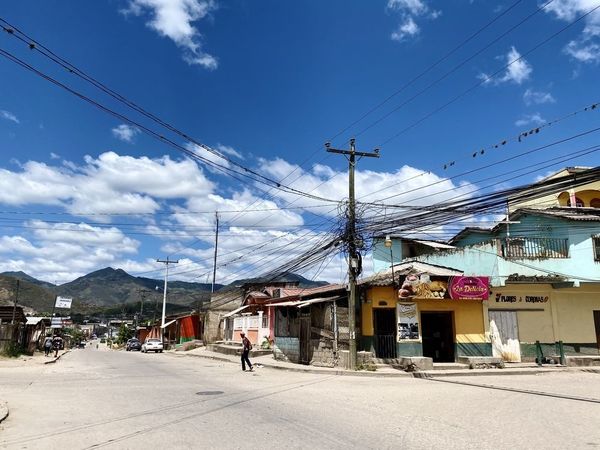 Juticalpa, Honduras
Juticalpa, HondurasThe Olancho Aid Foundation, a respected humanitarian organization, already operates a clean-water program and four schools in the valley: a special needs school, a bilingual grade school, a secondary school, and a bilingual secondary school. Hess’s team brainstormed ways for the foundation to build on those good works — and the good will it has generated — to create an economically sustainable community that “provides families an opportunity to stay well, stay together, and the opportunity to stay at home.”
Hess’s team discovered while in Honduras that supporting and developing resources for the small-business community — including cattle ranchers and small agricultural producers—was key to the economic development of the region.
“Through meetings with schools, universities, government agencies, and other community leaders in Juticalpa, our team realized that there were already many smart, creative ideas for economic development,” Hess said. “We just needed to figure out how our partner, OAF, could use its educational mission to make the connections necessary between these people and ideas and the community they were intended to serve.”
Their solutions were multi-pronged. They would support the Olancho Aid Foundation in capitalizing on its core competency as a bilingual educator by developing a secondary-school business curriculum and business focused adult-education opportunities. And they would enable it to act as a convener between the major stakeholders in the region, such as the local cattle associations and processing plants, to boost output and increase profits.
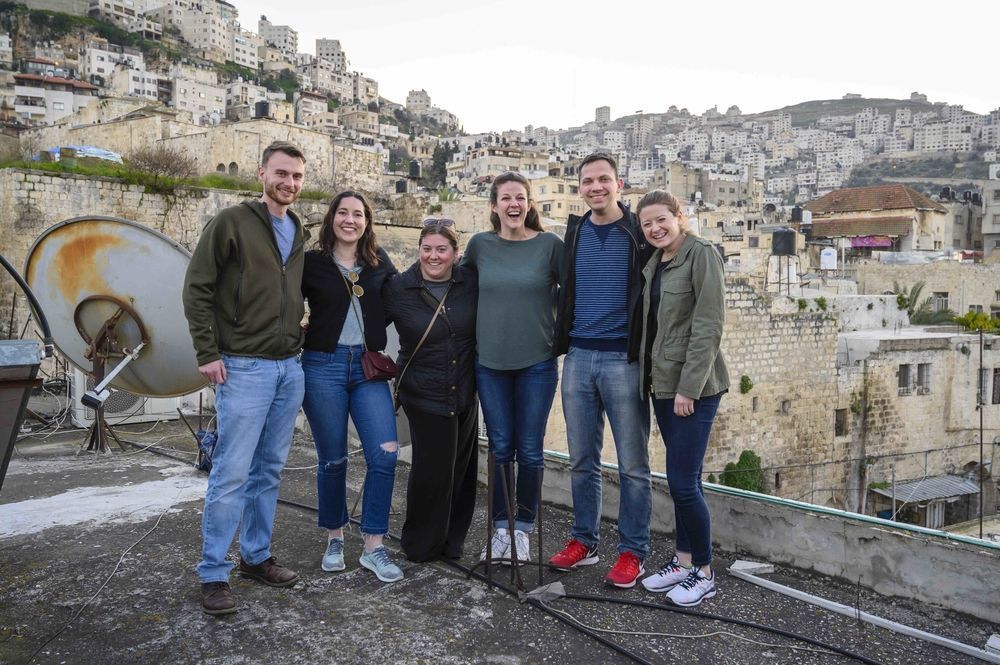 Molly Jergenson, right, and other members of the Business on the Frontlines Palestine team pose for a photo in the city of Nablus. Photo by Barbara Johnston/University of Notre Dame.
Molly Jergenson, right, and other members of the Business on the Frontlines Palestine team pose for a photo in the city of Nablus. Photo by Barbara Johnston/University of Notre Dame.Meanwhile, Jergenson and her team in the West Bank were serving Zeki Learning, a small nonprofit that makes handcrafted educational toys. Zeki is one of the brands under Child’s Cup Full, a 501(c)(3) organization devoted to providing training and job opportunities for talented refugee and low-income women artisans in the West Bank, where unemployment rates for young women are as high as 63 percent.
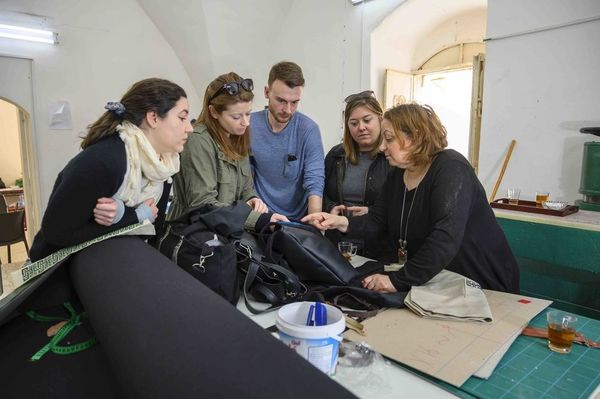 Business on the Frontlines students work at Child's Cup Full in Zababdeh, Palestine. Photo by Barbara Johnston/University of Notre Dame.
Business on the Frontlines students work at Child's Cup Full in Zababdeh, Palestine. Photo by Barbara Johnston/University of Notre Dame.The most pressing problem facing Zeki is the need to increase sales so as to provide consistent and reliable work. The team conducted a careful study of each toy’s strengths and weaknesses as a product and also researched consumer preferences, customer channels, regulatory requirements, and funding options. Ultimately, they concluded that a strong digital presence and advertising that highlighted the brand’s unique story as a women-owned and operated nonprofit in the West Bank were key to increasing sales in the United States.
On the legal front, moreover, the team determined that Zeki must register its brand as a trademark with the U.S. Patent & Trademark Office, improve its tracking compliance with U.S. Safety Regulations, and develop standard contracts to partner with social media influencers and other brands and organizations.
For her part, Jergenson said, “Business on the Frontlines is a tangible manifestation of Notre Dame’s mission to be a force for good in the world. Putting this concept into action as part of a cross-disciplinary team has been an incredible learning experience. Working in a place that continues to be devastated by ongoing conflict presents challenges that cannot be conveyed in a classroom. Despite the challenges, I will always be in awe of the warmth, hospitality, and grit of the Palestinian people. I’m excited to see Zeki grow in the future as the organization continues to build a strong community of women in the West Bank.”
More information about Business on the Frontlines is available at botfl.nd.edu.